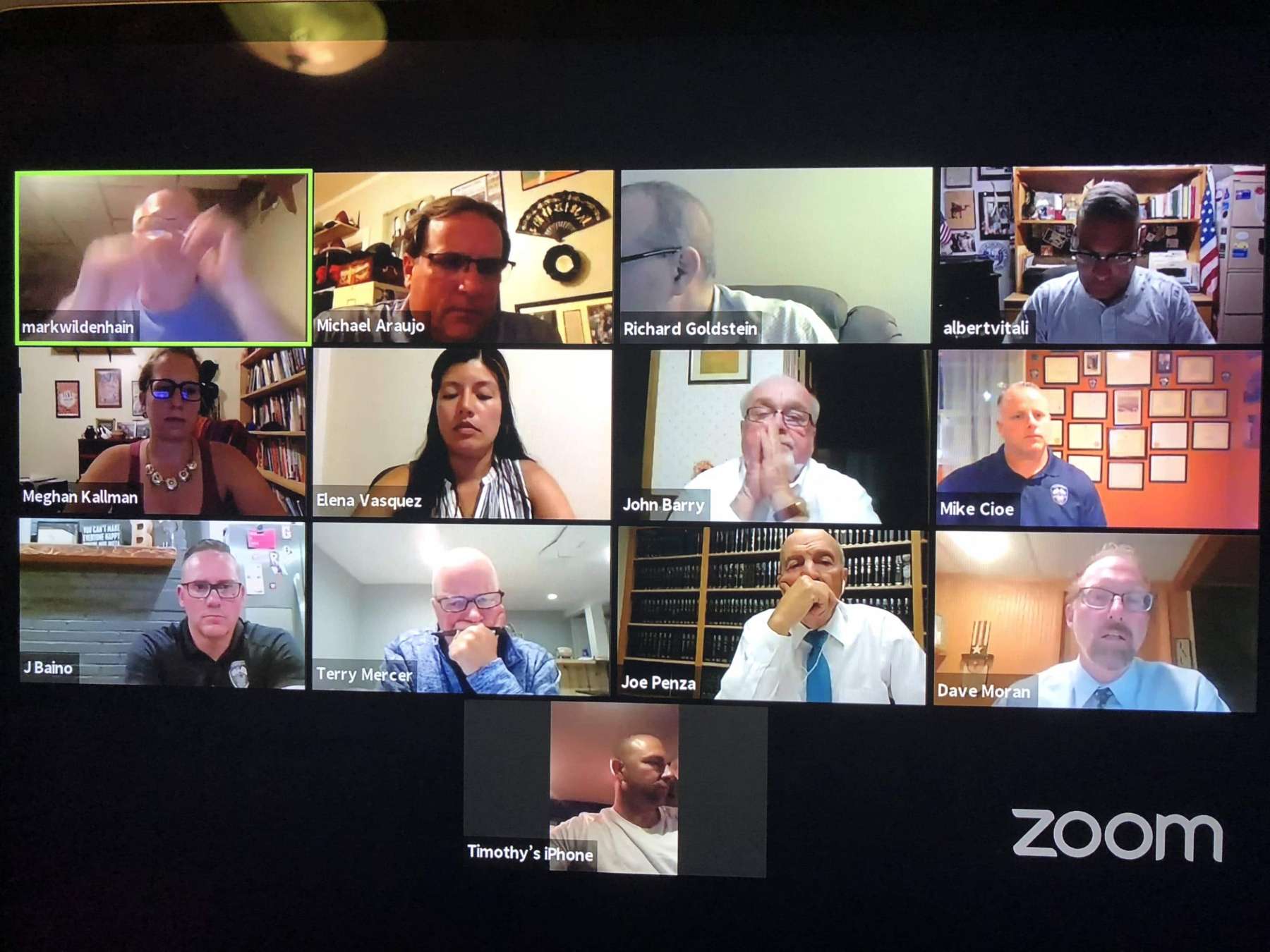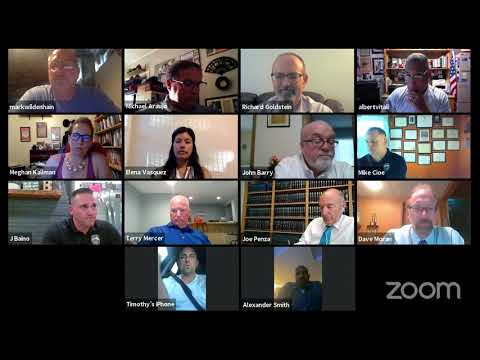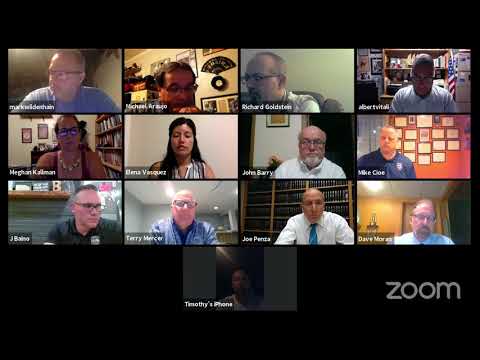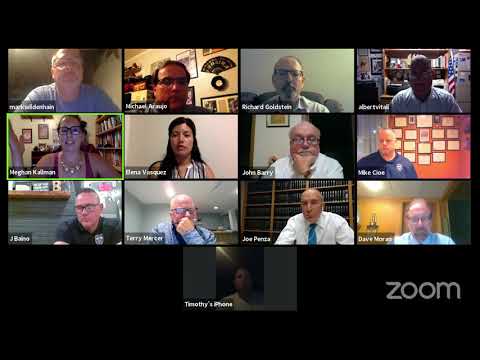Pawtucket City Council approves police budget over community objections
“This is a moment of reckoning, nationally, with policing issues and how they intersect with racism. To acknowledge that openly is not, in my view, to lay the nations’ problems at the feet of the Pawtucket police, though it might feel that way. Rather, it is to consider and honor the ways that people’s experience throughout the country resonates with
June 25, 2020, 10:22 am
By Steve Ahlquist
“This is a moment of reckoning, nationally, with policing issues and how they intersect with racism. To acknowledge that openly is not, in my view, to lay the nations’ problems at the feet of the Pawtucket police, though it might feel that way. Rather, it is to consider and honor the ways that people’s experience throughout the country resonates with people’s experience here, in our community…”
On Wednesday the Pawtucket City Council listened to around 90 minutes of testimony from nearly 50 concerned members of the public who wanted a delay in approving a proposed contract between the city and the police union on a vote of 8-1, with only Ward 5 Councilmember Meghan Kallman voting against the contract.
City Councilmembers listened to caller after caller asking for a delay in approving the police contract, noting the unparalleled changes that have been occurring nationwide with respect to policing in the wake of the police murder of George Floyd in Minneapolis. Here’s the video:
Most of the council seemed unmoved by the testimony.
Councilmember Elana Vasquez voted for the contract, despite the testimony asking her to delay the vote.
Vasquez thanked “the civil servants on the call, and “everyone who has called, emailed and given us input tonight.” Vasquez said that she stands with “peaceful protesters” and that she raised her “personal concerns” in private meetings with the Pawtucket Police Department.
“I asked questions concerning alternative ways of policing, by peace rather than force,” said Vasquez. “I raised my support of trainings, de-escalation and diversity, and I raised my objections to chokeholds, and I’m sure my concerns will be met.”
Councilmember Albert Vitale dismissed those who presented testimony by implying that their comments were “emotional” and “reactive” and not indicative of the “community as a whole,” before voting in favor of the contract.
“It is very clear to me that most of the people that I’ve spoken with, my colleagues, the administration, business owners, residents over these past weeks – and we all do agree that … changes need to be made in the way we do policing in Pawtucket. It’s going to take courageous changes, and we need to make the changes sooner than later.
“Not emotional changes – not to be emotional when we make these changes – not to be reactive – but we need to sit down and engage the community as a whole.”
Councilmember Michael Araujo seemed to believe that any police reforms must come from the federal and state government.
“I do believe we have a national policing culture and race relations problem,” said Araujo. “I do believe that there are changes coming, and it’s coming from the federal and the state – I know that the state is looking at the Police Bill of Rights…” Araujo said that public safety is a priority, and therefore he is going to support the contract.
Councilmember Mark Wildenhain bristled at the idea that the community would want to review the contract. “I understand my role as a legislator. We are elected to look at these things,” said Wildenhain, noting that he doesn’t remember having the community review previous contracts worked out by the council. “These are tasks that we are vested with and responsible for…”
Wildenhain dismissed the emails he received asking for a delay on the vote as “the 140-50 or so form letters I received from individuals that just put out the same thing.
“While I paid attention to them I also paid [attention] to the other people who actually supported us moving forward and keeping our community safe.”
Councilmember John Barry said that Pawtucket needs to have a dialog about policing with people in the community, “but that’s not going to affect this contract. I don’t see what holding up this contract for two weeks or two months is going to accomplish.”
Councilmember Terry Mercer agreed with Barry, saying that “this contract is not the mechanism to effectuate” changes in policing.
Council President David Moran said that the comments made at the hearing were “well spoken” and that he hopes to alleviate everyone’s fears about policing through changes in policy and additional police training.
Councilmember Timothy Rudd, a police officer, also supported the contract.
You can watch the council discuss and ultimately approve the contract here:
The lone no vote came from Councilmember Meghan Kallman. She issued the following statement shortly after the council meeting:
Thanks to everyone who is out here this evening, virtually, and to all those who are watching. I appreciate the many emails I’ve gotten over the last week as well. I appreciate the officers on this call for extending a meeting.
This is a moment of reckoning, nationally, with policing issues and how they intersect with racism. To acknowledge that openly is not, in my view, to lay the nations’ problems at the feet of the Pawtucket police, though it might feel that way. Rather, it is to consider and honor the ways that people’s experience throughout the country resonates with people’s experience here, in our community. George Floyd’s murder was chilling, and brought home people’s experiences of racism that have occurred in other situations. As a white person who represents many people of color, I openly acknowledge that I can never understand this, or how it feels. It’s my job to listen. This is an opportunity for us—the Pawtucket lawmakers, community, and police force–to consider what public safety means here, and if and how we might do it differently.
And the input we’ve received very clearly indicates to me that this community is ready to have a conversation. That’s why I proposed a summit, to do some structured listening. I appreciate the chief’s letter, but this is why I don’t feel comfortable approving any contract until we have done so. We need to think about the contract context of everything else that’s happening right now. And as a side note: I’m in union leadership myself, and I know how long contracts take to negotiate. Our is entirely up in the air right now because of COVID. Yes, it’s a delay and that’s frustrating, and nonetheless, the moment demands it.
There is a sociologist at the Brookings Institution named Dr Rashawn Ray who studies policing. His research, and the many conversations I’ve had in the past two weeks, stress a few things: that police officers are overworked, underpaid, and overstressed. They are functionally handed everything else that the rest of society has decided it doesn’t want to deal with or fund, including mental illness, landlord-tenant issues, and disputes between parents and children, to name just a few. Per his research, about 90 percent of calls for service have nothing to do with anything violent, things like potholes or McDonald’s being closed or a loose animal.
The idea is here just that many problems that the police are saddled with, may be better handled by people with different skill sets. Police work, as we currently have it set up, asks officers to be marriage counselors, mental health crisis professionals, conflict negotiators, social workers, child advocates, traffic safety experts, sexual assault specialists, and occasionally public safety officers authorized to use force. This arrangement doesn’t set anyone up to succeed—not the police, and not the community.
And I think we need to talk about it.
And the more that we have a robust and healthy community organization climate, the lower all the crime rates are. I’m full of sociologist references today, but a 2017 article showed that, for every 10 additional nonprofit organizations in a city, the murder rate goes down by 9%, the violent crime rate by 6%, and the property crime rate by 4%.
Now, about this contract. The contract was, I believe, approved by both parties back in February—someone correct me if that month is wrong. In either case it was some time back, and given that delay, it seems more than reasonable to offer a postponement to have a third party and the community look at it, because it’s already been approved for months without passage by the council. There are two reasons for this request: first, this budget has big financial implications for the city, and COVID-19 is coming for the city budget. Anything we’re passing right now deserves extra scrutiny even if we weren’t in the midst of a national debate about policing.
But we ARE in the middle of a national debate about policing.
And second, I would like for a third party to take a look at this for us, with an eye towards helping Pawtucket identify whether this draft has things in it that are problematic from a justice perspective—either on the city’s part, or the police’s, or both. This is a moment to pause, do the research, consult the experts, and most importantly, the community, and lead in a way that can increase freedom and wellbeing for all of the residents of our community.
Technical and procedural problems with the hearing:
Technical and procedural problems also plagued the meeting. “Dozens of residents are waiting to speak to the council and are being told by clerks that they are not able to, despite calling in on time,” said Pawtucket resident Adam Cable. “They are being told that they cannot join, or are told they will be joining and then are disconnected. I demand that residents be given a chance to testify.”
Each person who wished to testify was limited to two minutes, but it is unknown how many were kicked off or gave up trying to call in.
Attorney Barry Dolinger is representing Adam Cable, and he is filing a complaint with the Rhode Island Attorney General under the Open Meetings Act, and possibly a lawsuit.
“…once there is a period of public comment declared, a body cannot arbitrarily decide who can and cannot speak,” writes Dollinger. “Whether due to malice or incompetence, many were arbitrarily denied their turn to speak tonight, and on an issue of utmost importance to the local community: systemic racism as it relates to the structure of law enforcement.
“Accordingly, we will be filing a complaint with the Attorney General, and will consider filing a lawsuit for injunctive relief to declare this meeting null and void.”
Common Cause Rhode Island is helping people denied access to the meeting to write a complaint. Contact Galen Auer at Common Cause here.









